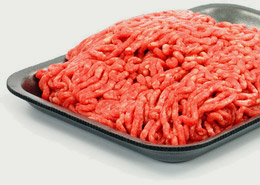
Raw meat diet for dogs?: Is it good or bad?
Posted in Pet Health on April 6, 2005. Last modified on April 30, 2019. Read disclaimer.
Some trainers believe that a strictly raw meat diet should be fed to working dogs because of the high protein and fat content (BARF World, Inc., 2005). However, dogs are omnivores, so meat is not a completely balanced food source. By itself, meat is deficient in many vitamins and minerals that dogs need to stay healthy. For one example, muscle does not contain the amount of calcium required by working dogs. Working dogs, especially racing and sled dogs, need calcium for strong bones. If your dog's "career" depends on strength and bone structure, feeding a diet low in calcium may greatly increase the risk of fractures. If you feed a raw meat only diet, you need to include nutritionist or veterinary recommended dietary supplements to decrease chances of developing bone problems.
+ Free Shipping & Returns on Eligible Items.
(*Amazon's Top 100 list updated hourly.)
Another risk with feeding raw meat diets is food-borne infections. Salmonella and other pathogens can cause serious problems in dogs. Salmonella is a bacterium that causes severe diarrhea, and it can spread from species to species, including you and your other family members (including other pets). Proper cooking and sanitation can eliminate this problem but adds substantial work to diet preparation. Dogs have been domesticated for approximately 12,000 years and, therefore, they cannot healthily be fed the same diets as their wild wolf ancestors.
FROM MAINTENANCE TO PERFORMANCE
Owners of working dogs frequently ask veterinarians how they should change their dog's diets as the animal moves from maintenance to performance periods. The best advice is to make gradual dietary changes beginning six to eight weeks before the performance season.
Feeding working dogs at the proper time is also important. Your dog needs approximately 23 hours to completely digest a meal. Fecal material in the colon can cause irritation during intense exercise. Gastrointestinal problems and diarrhea may ensue during and after exercise. Feed your dog 24 hours before intense exercise to prevent gastrointestinal problems. If your dog will be participating in an all-day or multiple day event, feed it as soon as possible or within the first four hours after exercise. Feed him once he is no longer panting, showing symptoms of heat stress, or signs of dehydration (Cline and Reynolds, 2005a). Allow him time to digest food before resuming activity in order to assure glycogen stores are replenished. Most professionals agree that feeding several small meals per day is most effective because it prevents increased GI fill that can decrease work capacity. Frequent small meals also keep dogs from becoming so hungry that their concentration shifts to food alone. This allows them to focus completely on their work. However, some professionals do believe police dogs work best if they are slightly hungry, theorizing that it increases alertness.
Large working breeds, such as Great Danes, are prone to a potentially deadly condition called bloat and should be monitored while eating to ensure they are not gulping their food too fast and consuming too much air. Carefully select the feeding regimen that works best for your dog's activity and that results in the desired performance.
OTHER POTENTIAL ISSUES
Parasite control is another issue worth considering when considering working dog performance. Heartworm and intestinal parasite prevention are both important concerns, as infestations of these parasites easily decrease your dog's capacity to work. Simply stated, parasites steal needed nutrients from your dog. Also pay attention to your dog's oral health. A pain-free mouth is necessary for maintaining body condition, as a dog will avoid chewing if it is painful.
IN SUMMARY
Working dogs require more calories and nutrients than typical house dogs. You may find that your working dog is less productive and efficient if fed regular dog food. If you have questions about the special dietary needs of your working dog, discuss them with your veterinarian, animal nutritionist, or professional trainer. Pay attention to your working dog's nutritional needs, and feed him properly so that he can stay healthy, happy, and helpful.
BACK: « Nutritional requirements for working dogs
Sources (Accessed April 6, 2005)
Companion Animals, Nutritional Requirements for Working Dogs, North Carolina Cooperative Extension Service (AG-667), Prepared by Kimberly Ange-van Heugten, M.S., Lecturer in Animal Science; Brynn Seabolt, B.S., Animal Science Honors Student; Brian R. Faris, Ph.D., Extension 4-H Youth Livestock Specialist at North Carolina State University; and Dempsy Ange, D.V.M., Beech Ridge Farms, Belhaven, NC. Contributions from Joan Eisemann, Ph.D., Professor of Animal Science, North Carolina State University and Leslie Yow, D.V.M., Asheboro Animal Hospital.
References:
BARF World, Inc. (n.d.). Feeding our pets BARF (Biologically Appropriate Raw Foods) - What are our aims? http://www.barfworld.com/html/barf_diet/barfdiet.shtml
Case, L. (1999). The Dog: It's Behavior, Nutrition and Health. Iowa State University Press, Iowa.
Case, L. P., Carey, D. P, Hirakawa, D. A., and Daristotle, L. (2000). Canine and Feline Nutrition: A Resource for Companion Animal Professionals. St. Louis, Missouri: Mosby, Inc.
Cheeke, P R. (2005). Applied Animal Nutrition; Feeds and Feeding. Upper Saddle River, NJ: Pearson Education Inc.
Cline, J. and A. Reynolds. (2005a). Canine Athletes and Carbohydrate Management During Exercise. Purina Pet Institute, 9(1), 6-7.
Cline, J. and A. Reynolds. (2005b). Feeding the Canine Athlete. Purina Pet Institute, 9(1), 2-5.
Eukanuba. (n.d.). Performance Diets for Performance Dogs. Retrieved Apr. 6, 2005, from http://www.eukanuba.com
Kelly, N., and J. Wills. (1996). Manual of Companion Animal Nutrition and Feeding. British Small Animal Veterinary Association, Gloucestershire, UK.
Lewis, L. D., M. L. Morris, Jr., and M. S. Hand. (1987). Small Animal Clinical Nutrition III. Topeka, Kansas: Mark Morris Associates.
Purina. (n.d.). Making Pet Food Recommendations.http://www.purina.com/dogs/nutrition.asp?article=238

